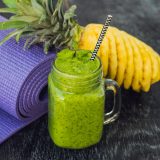Tips For a Stress-Free Holiday
Written By: Geri Wohl, CNC
www.bettereatingcoach.com
The holidays are approaching. Have you gotten all the presents yet? Do you get anxious just trying to get a parking spot at the mall? Has your workload increased as you prepare for vacation? And do you have to prepare dinner for all the family relatives in addition? The above questions aren’t meant to “stress you out” but are just a sampling of the internal conversations that may contribute to the anxiety some people feel at this time of year. Stress is part of our lives. How we deal with stress can result in either chronic health conditions or better overall balance in our lives.
The definition of stress is “a state of mental or emotional strain or tension resulting from adverse or very demanding circumstances.” This pressure results in both physical and emotional manifestations. Our prehistoric ancestors’ survival was absolutely dependent on stress. The “fight or flight” response caused physical reactions to ensure survival. The sympathetic nervous system controls these changes, including increased heart rate, higher blood pressure, faster breathing rate and elevated blood sugar levels. Our bodies are wired to deal with short bursts of stress required for our existence. However, our modern way of life has us experiencing stress constantly. The more frequent release of stress hormones, mainly cortisol and adrenaline by the adrenal glands, has an adverse effect on our bodies.
 Chronic stress is linked with many diseases and conditions. First, stress is associated with cardiovascular disease. Given that both heart rate and blood pressure rise during stressful periods, there is extra effort on the heart muscle to do its work. Second, cortisol causes spikes in blood glucose levels, which can trigger intense sugar cravings potentially leading to insulin resistance or diabetes. Research at UCSF Medical Center has found that women tend to have intense carbohydrate cravings especially for sweets during times of high cortisol levels. The end result of too much cortisol and blood sugar floating around the blood is belly fat and subsequently a higher number on the bathroom scale. Third, this pressure also affects the brain. The mind relives the earlier experiences, resulting in poor sleep, moodiness, anxiety and depression. Finally, the immune system is adversely affected, making us more susceptible to germs.
Chronic stress is linked with many diseases and conditions. First, stress is associated with cardiovascular disease. Given that both heart rate and blood pressure rise during stressful periods, there is extra effort on the heart muscle to do its work. Second, cortisol causes spikes in blood glucose levels, which can trigger intense sugar cravings potentially leading to insulin resistance or diabetes. Research at UCSF Medical Center has found that women tend to have intense carbohydrate cravings especially for sweets during times of high cortisol levels. The end result of too much cortisol and blood sugar floating around the blood is belly fat and subsequently a higher number on the bathroom scale. Third, this pressure also affects the brain. The mind relives the earlier experiences, resulting in poor sleep, moodiness, anxiety and depression. Finally, the immune system is adversely affected, making us more susceptible to germs.
Let’s focus on strategies to reduce stress and enjoy this special time with our family and friends.
- Exercise is one of the most effective stress busters. After just 30 minutes on a treadmill, participants scored 25% lower on tests measuring anxiety and demonstrated positive brain activity.
- Relaxation techniques help to slow the heart rate, lower blood pressure, slow the breathing rate and increase blood flow to the large muscles. These techniques help reduce frustration and anxiety. The use of visualization strategies helps one become more centered employing as many of our senses as possible. The techniques range from forming mental images of places or situations that are calming to focusing on releasing the tightness in muscles throughout the body to belly breathing. For more about specific strategies, contact me at www.bettereatingcoach.com.
- Sleep and rest are important in keeping stress in check. Poor sleep acts as a trigger for inflammation, overeating and immune system dysregulation. Avoid computer and TV screens 30 minutes to 1 hour before bed to allow the mind to begin to unwind.
- Eat nutritious foods and change your comfort foods to ones that truly support your body.
- As the adrenals are heavily taxed during stressful times, they need additional vitamin C. Foods high in vitamin C include bell peppers, berries, broccoli, oranges and papaya.
- Avocado is a wonderful stress-buster. It has plenty of B vitamins that are important for healthy nerves and brain cells. It is also high in monounsaturated fat, essential for cell wall production. High potassium levels support healthy nerve transmission and cell functionality. For more about avocados, see my article, “13 Health Benefits of Avocados.”
- Nuts including walnuts and cashews provide crunch that help diminish cravings. Nuts have a good combination of healthy fat and protein. Cashews are a good source of zinc that is essential for proper brain function and immune support. Walnuts are rich in omega 3 fatty acids.
- Chamomile tea is very calming to the nerves and has been touted for centuries as an excellent sleep aid.
- Dark chocolate is full of antioxidants. While we want to avoid sugar, a small piece of dark chocolate may satisfy your sweet tooth and can be calming.
- Grass fed beef contains omega 3 fatty acids that have been linked to lowering the risk of cancer, cardiovascular disease, depression and other inflammatory conditions. For more about grass fed beef, see my article, “Grass-Fed Beef vs. Grain-Fed Beef.”
- Oatmeal is a complex carbohydrate that is high in fiber. The extra fiber will aid in slowing digestion and result in longer satiety. Oatmeal is also soothing and warming. The carbohydrates in oatmeal cause the brain to produce serotonin, our “feel-good” neurotransmitter.
- Wild salmon is packed with omega 3 fatty acids. These fatty acids assist in controlling cortisol and adrenaline levels from spiking when faced with stressful situations.
- Spinach is rich in magnesium, the calming mineral. It can be added to many dishes for added calming support. Another way of getting magnesium is taking a relaxing bath in Epsom salts. What a great way to end the day!
- There are many other ways to reduce stress. Be mindful of your surroundings. Slow down and arm yourself with strategies to be good to yourself. Laugh–it is really hard to be tense when you are smiling and laughing. Identify at least one positive idea a day that makes you feel good.
Remember the value of the holiday is spending quality time with loved ones and appreciating the beauty around us. Wishing you a wonderful holiday and a happy and healthy New Year!
© Geri Wohl












